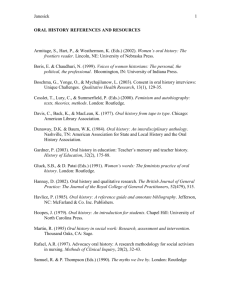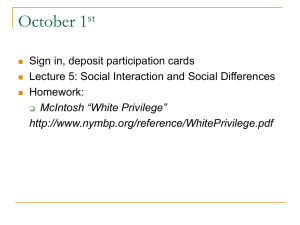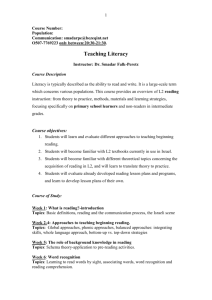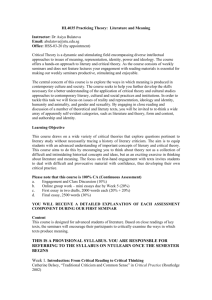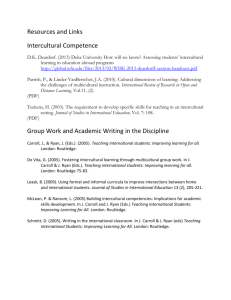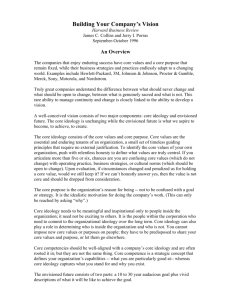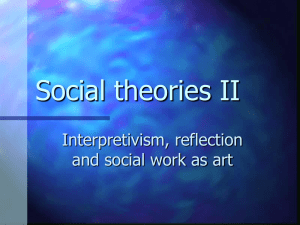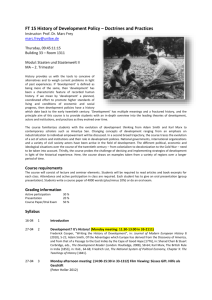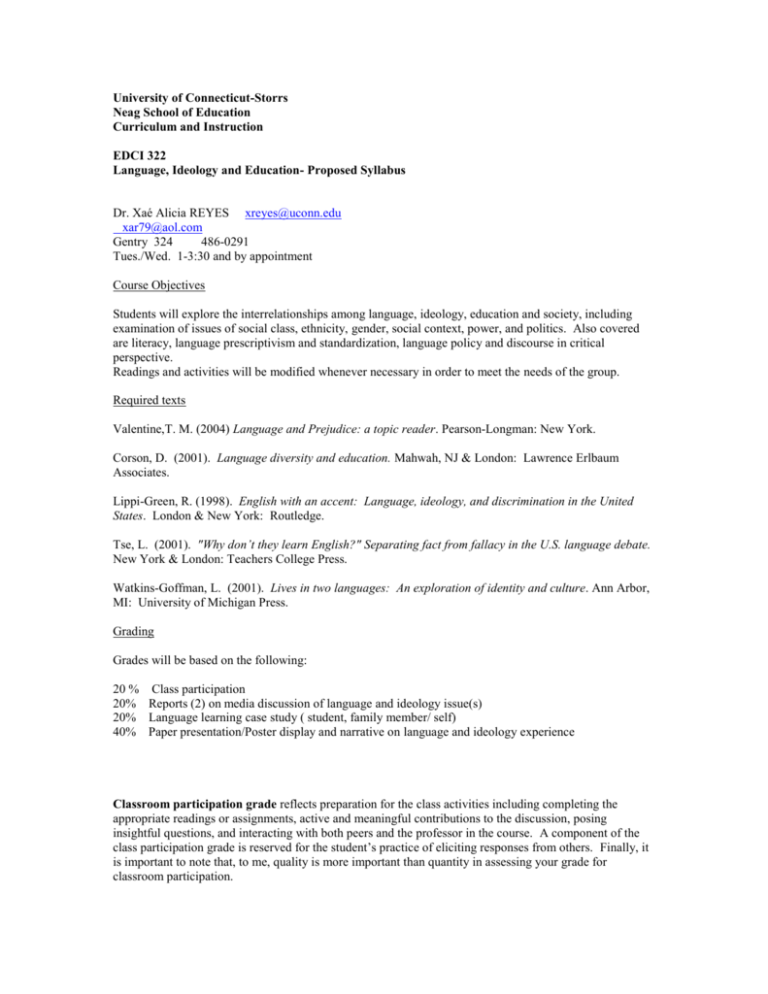
University of Connecticut-Storrs
Neag School of Education
Curriculum and Instruction
EDCI 322
Language, Ideology and Education- Proposed Syllabus
Dr. Xaé Alicia REYES xreyes@uconn.edu
xar79@aol.com
Gentry 324
486-0291
Tues./Wed. 1-3:30 and by appointment
Course Objectives
Students will explore the interrelationships among language, ideology, education and society, including
examination of issues of social class, ethnicity, gender, social context, power, and politics. Also covered
are literacy, language prescriptivism and standardization, language policy and discourse in critical
perspective.
Readings and activities will be modified whenever necessary in order to meet the needs of the group.
Required texts
Valentine,T. M. (2004) Language and Prejudice: a topic reader. Pearson-Longman: New York.
Corson, D. (2001). Language diversity and education. Mahwah, NJ & London: Lawrence Erlbaum
Associates.
Lippi-Green, R. (1998). English with an accent: Language, ideology, and discrimination in the United
States. London & New York: Routledge.
Tse, L. (2001). "Why don’t they learn English?" Separating fact from fallacy in the U.S. language debate.
New York & London: Teachers College Press.
Watkins-Goffman, L. (2001). Lives in two languages: An exploration of identity and culture. Ann Arbor,
MI: University of Michigan Press.
Grading
Grades will be based on the following:
20 % Class participation
20% Reports (2) on media discussion of language and ideology issue(s)
20% Language learning case study ( student, family member/ self)
40% Paper presentation/Poster display and narrative on language and ideology experience
Classroom participation grade reflects preparation for the class activities including completing the
appropriate readings or assignments, active and meaningful contributions to the discussion, posing
insightful questions, and interacting with both peers and the professor in the course. A component of the
class participation grade is reserved for the student’s practice of eliciting responses from others. Finally, it
is important to note that, to me, quality is more important than quantity in assessing your grade for
classroom participation.
2 Media discussions of language issue(s)-- brief (2 pages) outline of coverage in newpapers, magazines,
television, radio, or film regarding a topic related to course content.
The poster display/ research paper will be a visual display and/or typewritten (10-12 page/20-25)
narrative of research on "otherness" in a linguistic context different from your own/case study of language
learner/ descriptive study of classroom dynamics around language.
Tentative Calendar
Bibliography
Bohlken, B. (1996) " The idiom experience" in A Review of General Semantics. 53(2):218.
Darder, A. (1991). Culture and Power in the Classroom: a Critical Foundation for Bicultural Education.
Westport, CN: Bergin and Garvey.
D’Innocenzo, M. & Sirefman, J.F. (Eds.) (1992) Immigrants and Ethnicity: American Society—"Melting
Pot" or "Salad Bowl". Westport, CT: Greenwood.
DeVos, G.A. (1993) A Psychocultural Approach to Ethnic Interaction in Contemporary Research. In
Bernal, M. E. and Knight, G.P. (Eds.) Ethnic Identity: Formation and Transmission among Hispanics and
other Minorities.Albany, NY: SUNY Press.
Fox, G. (1996) Hispanic Nation: culture,politics, and the Constructing of Identity. Secacus: NJ: Carol
Publishing Group.
Freire, P. (1972) Pedagogía del oprimido. Mexico. SigloVeintiuno editores.
Giroux, H. (1994) Disturbing pleasures: learning popular culture. New York and
London: Routledge.
Goodyear, M. (1996) "Divided by a common language: diversity and deception in the world of global
marketing." Journal of the Market Research Society 38 (2): 105.
Hollins, E.. (1997). Culture in School Learning: Revealing the Deep Meaning. New Jersey: Lawrence
Erlbaum.
LeCompte, M.D. (1987) "Bias in the biography: bias and subjectivity in ethnographic research."
Anthropology and Education Quarterly. 18, 43-52.
LeCompte, M.D. & Preissle, J. (1993). Ethnography and Qualitative Design in Educational Research. (2nd
ed.) San Diego, CA: Academic Press.
Morris, M (1981) Saying and meaning in Puerto Rico : some problems in the ethnography of discourse
Oxford: Pergamon Press, 1981
Nieto, S. (Ed.)(2000). Puerto Rican Students in U. S. Schools Mahwah, NJ: Lawrence Erlbaum Associates
Oboler, S. (1995) Ethnic labels, Latino lives: Identity and the politics of (re)presentation in the U.S. U. of
Minnesota Press.
Osborn, T. (2000) Critical reflection and the foreign language classroom. Wesport,CT: Bergin and Garvey.
Padilla, F. ( 1997) The struggle of Latino/a university students: in search of a liberating education. New
York, NY: Routledge.
Reyes, X.A. & Rios, D. (2003) Eds. "Latinos, Education and Media" Special Issue of Journal of Latinos
and Education, 2(1).
Trueba, H.T. (1993) Culture and language: the ethnographic approach to the study of learning
environments. In B.J. Merino, H.T. Trueba, & F.A. Samaniego (Eds.) Language and culture in learning:
Teaching spanish to native speakers of Spanish (pp.26-44) Washington,D.C.: Falmer Press.
Valdés, G. (1996) Con respeto, bridging the distances between culturally diverse families and schools: and
ethnographic portrait. New York and London: Teachers College Press.

